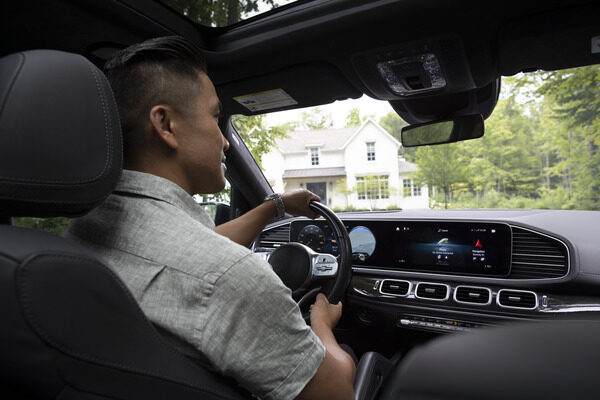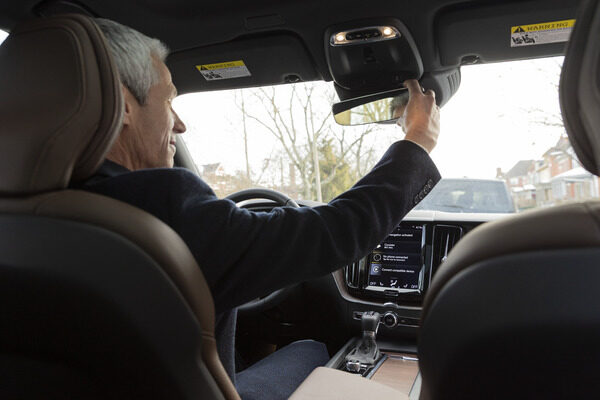
While we typically drive a quarter of the time at night, studies show that 50% of traffic deaths happen at night. [1] It doesn’t matter whether you know the road you’re driving on or not; it is always more dangerous to drive at night. With a few extra precautions, you can reduce the risk of something dangerous happening while driving at night.
Why is driving at night more dangerous?
There are several reasons why driving at night is significantly more dangerous than during the day.
- Compromised night vision: This is especially prevalent in drivers over 60.
- Fatigue: 1 in 25 adult drivers report falling asleep in the last 30 days, and many more admit to driving while sleep-deprived. [2]
- Rush hour: Roads get more crowded and dangerous between 4 and 7 p.m. due to drivers eager to get home after work.
- Impaired drivers: Drivers impaired by drugs and alcohol are more frequently on the road after dark.
Tips for driving in the dark
1. Be a defensive driver.
Defensive driving is utilizing safe driving strategies to address identified hazards predictably. When you drive defensively, this reduces your driving risk by anticipating situations and making well-informed decisions. [3]
2. Minimize distractions.
Do not multi-task while driving. Whether it’s adjusting your mirrors, selecting music, eating, making a phone call, or reading a text or email―do it before or after your trip, not during. [4]
3. Clean your windshield.
Built-up grime on your windshield can increase the glare from other cars and streetlights, making it harder for you to see the road. Damaged windshields can have a similar effect, so fix any cracks before driving. [5]
4. Don’t drive while drowsy.
It’s always important to ensure you’re well-rested and alert when you’re behind the wheel. But your brain makes more sleep-inducing melatonin when it’s dark, meaning you’re more likely to get tired while driving at night. If you experience eye drooping or extreme fatigue, find a place to stop and rest for the night. [5]
5. Check your headlights.
Keeping headlights clean and lit is the key to safe night driving. If just one headlight is illuminated, it not only cuts down on your visibility but can also get you a citation from law enforcement. Double-check before driving that both headlights are on and working. [6]
6. Slow down.
It’s never a good idea to drive too fast and follow the driver in front of you too closely. This could cause an accident if they stop too suddenly. Also, the closer your headlights are, the brighter they can seem and the more distracting they can be. [6]
7. Watch out for pedestrians.
Always take extra time to watch for pedestrians on poorly lit roads. People don’t always wear safety gear, which can be incredibly difficult to see after dark. Also, make sure you’re not driving distracted, whether texting, adjusting the radio, or eating in your car. Taking your full attention off the road is a bad idea. [7]
8. Keep up with your yearly vision tests.
Stay current on eye exams to ensure your vision is at its best, especially while driving at night. If you wear glasses, ensure they are anti-reflective to reduce glare and increase visibility. [8]
9. Watch out for wildlife.
Make sure to be extra cautious, slow down, and keep an eye out for any big animals. Hitting a deer or an elk is hazardous to drivers and passengers, often resulting in thousands of dollars in vehicle damage. [9]
One of the best ways to protect yourself and your vehicle from any harm from driving at night is to ensure you have the right auto insurance.
Sources:
[1] “The Most Dangerous Time to Drive,” nsc.org/road/safety-topics/driving-at-night? (accessed February 2025)
[2] “Drivers are Falling Asleep Behind the Wheel,” nsc.org/road/safety-topics/fatigued-driver (accessed February 2025)
[3] “What is Defensive Driving?” safemotorist.com/articles/defensive-driving (accessed February 2025)
[4] “What You Can Do to Prevent Distracted Driving,” cdc.gov/distracted-driving/safety/ (accessed February 2025)
[5] “10 Night Driving Safety Tips You Should Know for Future Road Trips,” self.com/story/night-driving-safety-tips (accessed February 2025)
[6] “Enjoy the Stars: 5 Critical Tips for Safe Night Driving,” driving-tests.org/beginner-drivers/top-5-tips-for-safe-night-driving (accessed February 2025)
[7] “Night Driving Tips: What You Need to Know,” idrivesafely.com/defensive-driving/trending/night-driving-tips-what-you-need-know (accessed February 2025)
[8] “Living With Astigmatism,” verywellhealth.com/living-with-astigmatism-3422087 (accessed February 2025)
[9] “Watch for wildlife on highways and avoid costly collisions,” Connor Liess, cdapress.com/news/2022/nov/24/watch-wildlife-highways-and-avoid-costly-collision (accessed February 2025)
Disclaimer:
The information included here is designed for informational purposes only. It is not legal, tax, financial or any other sort of advice, nor is it a substitute for such advice. The information may not apply to your specific situation. We have tried to make sure the information is accurate, but it could be outdated or even inaccurate in parts. It is the reader’s responsibility to comply with any applicable local, state or federal regulations. Nationwide Mutual Insurance Company, its affiliates and their employees make no warranties about the information nor guarantee of results, and they assume no liability in connection with the information provided. Nationwide and the Nationwide N and Eagle are service marks of Nationwide Mutual Insurance Company. © 2025 Nationwide



